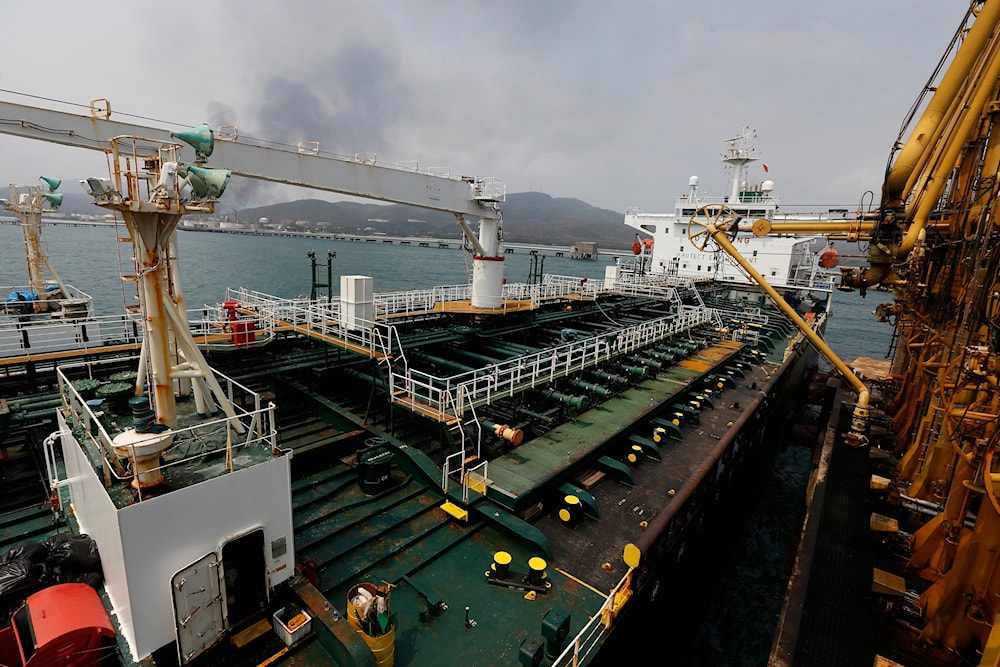Iran impounds US oil cargo ship in Gulf after court order
Iran impounds a US oil cargo ship in the wake of a court order against the US over its sanctions that are preventing the entry of key pharmaceuticals to the country.
-

In this May 25, 2020 file photo, the Iranian oil tanker Fortune is anchored at the dock of the El Palito refinery near Puerto Cabello, Venezuela (AP)
The Islamic Republic of Iran confiscated a US oil cargo in the Gulf on Wednesday, in the wake of a court order stemming from a complaint filed by Iranian Epidermolysis Bullosa (EB) patients against the United States.
A group of Iranian citizens afflicted with the rare inherited skin disorder, Epidermolysis Bullosa, took their case to the international relations legal court (branch 55) in Tehran.
They said the sanctions imposed by the US and other Western nations had obstructed a Swedish company from supplying essential medical bandages and pharmaceuticals to Iran.
The patients claimed that this obstruction caused severe physical and mental harm to them, exacerbating their already challenging medical conditions.
In response to the court's order, Iranian authorities seized an oil cargo belonging to the United States from the ADVANTAGE SWEET oil tanker in the Gulf. The confiscated shipment is estimated to be valued at more than $50 million.
Tens of thousands of people in Iran are suffering from numerous diseases whose treatment lies in the lifting of sanctions on the Islamic Republic, as the punitive measures are preventing pharmaceutical companies from entering the Iranian market due to fears of sanctions.
One such disease is thalassemia, a disease that has swept the southern province of Sistan-Balochistan, killing children despite not being an inevitably fatal condition; its treatment is quite simple. All a patient needs is regular blood transfusions and oral medications that remove the excess iron build-up in the body.
Maximum pressure policy
The harsh sanctions, known as part of the "maximum pressure" campaign waged by the US against the Islamic Republic, caused the supplies of the iron-chelating drugs to dwindle, alongside many other drugs aimed at helping against numerous medical issues.
In one case reported on by The Intercept in June 2023, that of 10-year-old boy Amir Hossein Naroi, Trump's maximum pressure campaign, which was upheld by his successor Democrat administration, caused his organs to start failing due to complications as of the summer of 2022.
His organs were also heavily damaged due to the excess iron in his blood; this all culminated in his terrible death at a hospital, surrounded by his family and medical staff that could not do anything to help him due to the lack of medicine.
The US foreign policy is ultimately causing the problems suffered by Iranians, multinational corporations providing drugs to Iran, and banks acting as intermediaries for attempted purchases, according to documents obtained by The Intercept.
The debacle has put the US government in the limelight: It is facing a lawsuit from the NGO, Iran Thalassemia Society. The Iran-based NGO is arguing that thousands of Iranians were killed or sustained injuries due to the sanctions imposed on the country despite the US claiming that humanitarian trade would be exempt from sanctions.
However, the comprehensive sanctions on the Iranian banking sector caused foreign companies to be too afraid of trading with Iran out of fear of sanctions.
"The American government has said that they will consider some exceptions for humanitarian aid, but in practice, we have seen that there are no exceptions," staff attorney at the Iran Thalassemia Society Mohammed Faraji said.
Even bandages not exempt
Children and patients of EB have been unable to access a certain type of bandage that provides vital relief and prevents life-threatening infections, with special UN rapporteur Alena Douhan reaching out to the Swedish firm and government to address what has been described as "shortfalls in the due diligence processes applied to ensure that no human rights are violated."
Despite pharmaceutical and medical equipment not falling under international sanctions, the US nevertheless prevented Tehran from using the international payment systems, leading it to suffer from a shortage of drugs needed for the treatment of nearly 30 illnesses, including cancer.
The sanctioning of these supplies has at times led to desperate workarounds by foreign governments, including a 2020 attempt by the German government and UNICEF to purchase and deliver a shipment of the specialized bandages to Iran as doctors have been forced to rely on indigenously-made equipment to help ease the crises facing the country.
Read more: US sanctions on Iran killing children

 4 Min Read
4 Min Read








